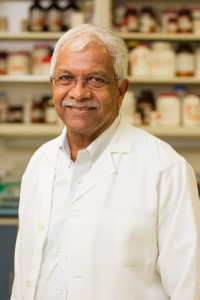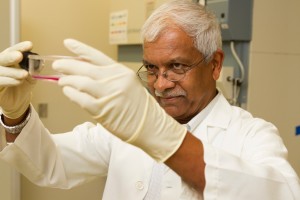Starving Cancer

The human body is made up of billions of cells all are the building blocks of our organs and tissues. With cancer, cells in a part of the body can begin to grow out of control. Vadivel Ganapathy, Ph.D., professor and chair of the Department of Cell Biology and Biochemistry, has found a new strategy for cancer therapy — starve the cancer.
“We work on different cancers, breast, colon, lung and pancreatic,” Ganapathy said. “Cancer is so difficult to treat. We come up with so many drugs but none of them turns out to be an ideal drug. Most drugs on the market right now only extend the lifespan of a cancer patient to a small extent, often only in terms of months. No one has been able to come up with a drug to cure it.”
Ganapathy came from Georgia Regents University to the Texas Tech University Health Sciences Center School of Medicine less than a year ago and has continued research focusing on providing drug therapies to stop cancer. In order to come up with a new idea or drug target to extend life much longer, he and his research team knew they had to look at the logic that cancer grows out of control.
“Cancer just keeps growing,” Ganapathy said. “One thing that differentiates cancer from a normal tissue is that the cancer cells need a lot of nutrients like food for growth. Question is, how does the cancer get this food? If you can find the mechanism by which the cancer cells get their food, logic is very simple. Stop providing the food; then we can starve the cancer cells and bring them to their death.”
Ganapathy’s lab first identified how cancer gets its food. The nutrients included glucose, amino acids and vitamins. The next step was to find the mechanism to starve the cancer cells. How can the delivery of nutrients to cancer cells be stopped?
“The tricky thing is that normal tissues need nutrients to survive as well,” Ganapathy said. “You come up with a drug that can differentiate between the entry of the nutrients into the normal cell and versus the cancer cell. You don’t want to kill normal cells.”
Ganapathy knew his research team needed to come up with a drug, which would selectively starve only cancer cells to death. If they did that, such drugs would be selective for cancer because the mechanism does not operate in the normal cell.
With that in mind, he identified the protein called the amino acid transporter SLC6A14.
He explained that the transporter is sitting on the cell and allows certain nutrients
to go from the blood and into the cell. Since the protein transports the nutrients
from outside to inside the cell, the researchers called them transporters.

“We have identified this transporter, which will transpose amino acids into cells,” Ganapathy said. “This transporter is presented at very high levels in cancer cells and low levels in normal cells. If we can come up with drug to stop the function of this transporter, it will have a selective effect on cancer cells. For instance, lung cancer must have a different transporter to get amino acids because our transporter is not found in this cancer. Thus, our transporter SLC6A14 is not a universal drug target for all cancers.”
In Ganapathy’s research lab, manipulating the gene for this transporter in mice provided proof of principal. The mouse is called the “knockout mouse” because the gene that makes this transporter is knocked out in this mouse. Interestingly, the knockout mouse looked normal.
“We took the knockout mouse and did an experiment to induce breast cancer in these mice,” Ganapathy said. “In normal mice, cancer developed as expected. But in the knockout mouse, cancer development was much slower. This showed us that the transporter is needed for breast cancer; if it is not there, growth of cancer is delayed.”
In humans, genes cannot be removed. Ganapathy and his research team had to come up with a small molecule or drug that can block the entry of nutrients via this transporter to reduce growth in the cancer. They found the drug blocks the transport system. The team then took that idea and made a new class of anti-cancer drugs. This drug has been effective in mice with breast cancer and pancreatic cancer, but has not yet been tested in humans. Ganapathy hopes to test this drug in cancer patients.
“We now have to take this to the next step, which is clinical trials with humans,” Ganathapy said.
Related Stories
Celebrating Veterans: TTUHSC’s General Martin Clay’s Legacy of Service and Leadership
From his initial enlistment in the Army National Guard 36 years ago to his leadership in military and civilian health care management roles, Major General Martin Clay’s career has been shaped by adaptability, mission focus and service to others.
Texas Tech University Health Sciences Center School of Nursing Named Best Accelerated Bachelor of Science in Nursing Program in Texas
The TTUHSC School of Nursing Accelerated Bachelor of Science in Nursing (BSN) program has been ranked the No. 1 accelerated nursing program in Texas by RegisteredNursing.org.
TTUHSC Names New Regional Dean for the School of Nursing
Louise Rice, DNP, RN, has been named regional dean of the TTUHSC School of Nursing on the Amarillo campus.
Recent Stories
National Academy of Inventors Names TTUHSC Faculty Senior Members
The National Academy of Inventors (NAI) has designated two current and one former TTUHSC faculty researchers as Senior Members.
The John Wayne Cancer Foundation Surgical Oncology Fellowship Program at Texas Tech University Health Sciences Center Announced
TTUHSC is collaborating with the John Wayne Cancer Foundation and has established the Big Cure Endowment, which supports the university’s efforts to reduce cancer incidence and increase survivability of people in rural and underserved areas.
TTUHSC Receives $1 Million Gift from Amarillo National Bank to Expand and Enhance Pediatric Care in the Panhandle
TTUHSC School of Medicine leaders accepted a $1 million philanthropic gift from Amarillo National Bank on Tuesday (Feb. 10), marking a transformational investment in pediatric care for the Texas Panhandle.
